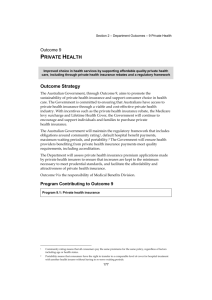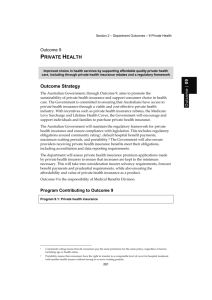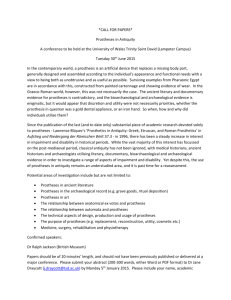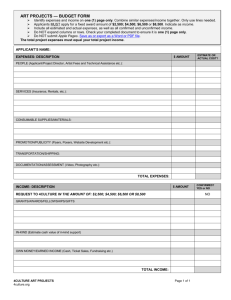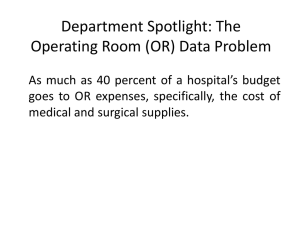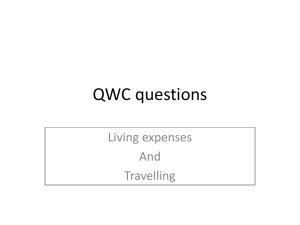Private Health - Department of Health
advertisement
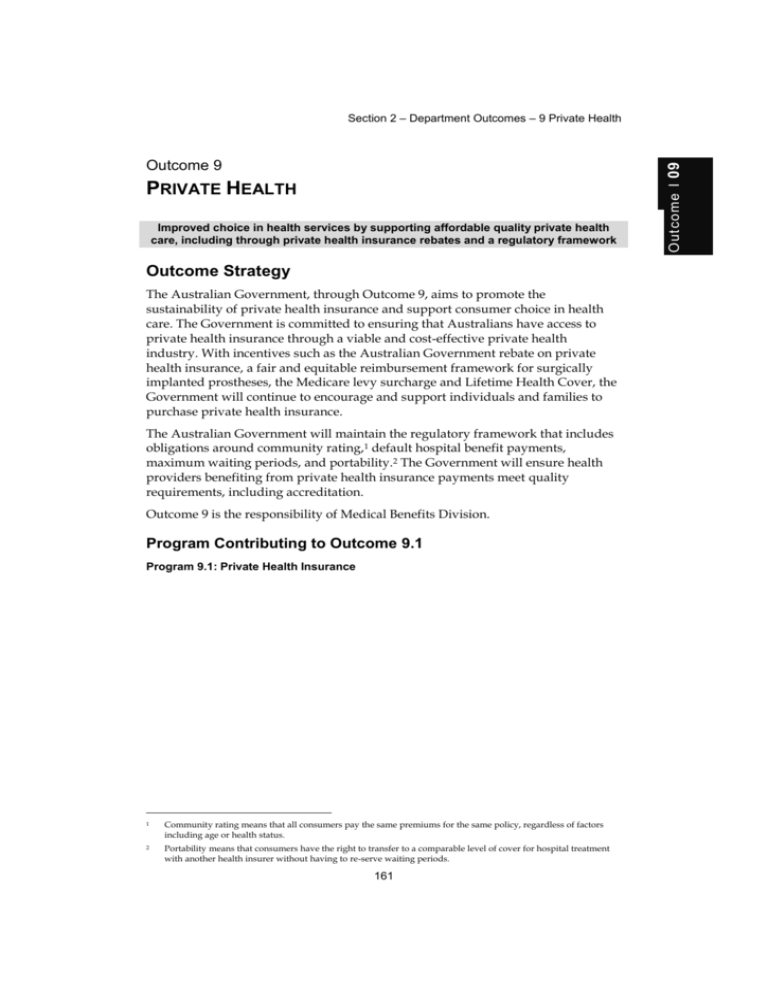
Outcome 9 PRIVATE HEALTH Improved choice in health services by supporting affordable quality private health care, including through private health insurance rebates and a regulatory framework Outcome Strategy The Australian Government, through Outcome 9, aims to promote the sustainability of private health insurance and support consumer choice in health care. The Government is committed to ensuring that Australians have access to private health insurance through a viable and cost-effective private health industry. With incentives such as the Australian Government rebate on private health insurance, a fair and equitable reimbursement framework for surgically implanted prostheses, the Medicare levy surcharge and Lifetime Health Cover, the Government will continue to encourage and support individuals and families to purchase private health insurance. The Australian Government will maintain the regulatory framework that includes obligations around community rating,1 default hospital benefit payments, maximum waiting periods, and portability.2 The Government will ensure health providers benefiting from private health insurance payments meet quality requirements, including accreditation. Outcome 9 is the responsibility of Medical Benefits Division. Program Contributing to Outcome 9.1 Program 9.1: Private Health Insurance 1 Community rating means that all consumers pay the same premiums for the same policy, regardless of factors including age or health status. 2 Portability means that consumers have the right to transfer to a comparable level of cover for hospital treatment with another health insurer without having to re-serve waiting periods. 161 Outcome I 09 Section 2 – Department Outcomes – 9 Private Health Budget Statements – Department of Health and Ageing Outcome 9 Budgeted Expenses and Resources Table 9.1 provides an overview of the total expenses for Outcome 9 by program. Table 9.1: Budgeted Expenses and Resources for Outcome 9 Program 9.1: Private health insurance Administered expenses Ordinary annual services (Appropriation Bill No. 1) Special appropriations Private Health Insurance Act 2007 - private health insurance rebate - risk equalisation trust fund - council administration levy Departmental expenses Departmental appropriation1 Expenses not requiring appropriation in the budget year2 Total for Program 9.1 Outcome 9 totals by appropriation type Administered expenses Ordinary annual services (Appropriation Bill No. 1) Special appropriations Departmental expenses Departmental appropriation1 Expenses not requiring appropriation in the budget year2 Total expenses for Outcome 9 Average staffing level (number) 1 2 2012-13 Estimated actual $'000 2013-14 Estimated expenses $'000 2,591 5,247 5,135,350 420,195 6,226 4,916,721 470,534 6,590 11,410 321 11,365 434 5,576,093 5,410,891 2,591 5,561,771 5,247 5,393,845 11,410 321 11,365 434 5,576,093 5,410,891 2012-13 68 2013-14 67 Departmental appropriation combines "Ordinary annual services (Appropriation Bill No 1)" and "Revenue from independent sources (s31)". "Expenses not requiring appropriation in the Budget year" is made up of depreciation expense, amortisation expense, makegood expense and audit fees. 162 Program 9.1: Private health insurance Program Objectives Ensure the sustainability of the private health insurance rebate The Australian Government aims to make expenditure on the private health insurance rebate sustainable through income testing of recipients, removal of the rebate on lifetime health cover loadings, and indexing the Government’s contribution by the lesser of Consumer Price Index or the actual increase in commercial premiums, while ensuring that it continues to provide assistance to those who need it most. The Department will work with the Australian Taxation Office, the Department of Human Services and private health insurers to inform consumers and implement the changes. Ensure the Australian Government rebate on private health insurance covers clinically proven treatments In 2012-13 the Government announced a review of the rebate on private health insurance for natural therapies. The Department will work with the National Health and Medical Research Council to complete the review in 2013. Following completion of the review, the Government will introduce, through Regulation, a list of natural therapies underpinned by a robust evidence base that will continue to receive a rebate. It is expected that the Regulation will take effect on 1 January 2014. Promote an affordable and sustainable private health insurance sector The Australian Government will undertake discussions with industry and consumer groups on options for further improvements to premium setting that will drive competition and continue to deliver strong consumer protection. The Department will continue to publish information about the premium approval process including average premium increases for individual insurers.3 Improve access to prostheses through private health insurance The Australian Government is implementing a fair and equitable prostheses reimbursement framework to ensure private health insurance expenditure is directed to clinically and cost-effective prostheses with minimal co-payments for patients. During 2013-14, the Department will continue to implement the recommendations from the Review of Health Technology Assessment in Australia (HTA Review) (December 2009). This will include further developing evidence based processes for listing of new prostheses and the review of listed prostheses to enhance public confidence in the process through improved outcomes. The Department will continue to develop an online system for submitting and processing applications to list prostheses on the Prostheses List and will continue to consult with stakeholders on ways to support Prostheses List arrangements to achieve cost-effective and clinically appropriate outcomes. 3 Available at: <www.health.gov.au/internet/main/publishing.nsf/Content/private-1 > 163 Outcome I 09 Section 2 – Department Outcomes – 9 Private Health Budget Statements – Department of Health and Ageing Program 9.1 is linked as follows: The Department of Human Services (Services to the Community – Program 1.1) to administer Lifetime Health Cover mail-out and the private health insurance rebate. Program 9.1: Expenses Table 9.2: Program Expenses 2012-13 Estimated actual $'000 Annual administered expenses Ordinary annual services 2,591 Special appropriations Private Health Insurance Act 2007 - private health insurance rebate 5,135,350 - risk equalisation trust fund 420,195 - council administration levy 6,226 Program support Total Program 9.1 expenses 2013-14 Budget $'000 2014-15 Forward year 1 $'000 2015-16 Forward year 2 $'000 2016-17 Forward year 3 $'000 5,247 2,247 2,247 2,247 4,916,721 5,043,188 5,154,310 5,255,088 470,534 525,225 584,268 647,663 6,590 6,972 7,236 7,453 11,731 11,799 10,998 11,057 11,229 5,576,093 5,410,891 5,588,630 5,759,118 5,923,680 Program 9.1: Deliverables Qualitative Deliverables for Program 9.1 Ensure the sustainability of the private health insurance rebate Qualitative Deliverable Insurers affected by changes to the Australian Government rebate on private health insurance are adequately informed of these changes 2013-14 Reference Point or Target Stakeholder discussions will be undertaken to convey the relevant information Ensure the Australian Government rebate on private health insurance covers clinically proven treatments Qualitative Deliverable Stakeholders informed of the review’s progress, findings and subsequent regulation changes 2013-14 Reference Point or Target The review’s progress will be reported on the Department’s website Stakeholders will be advised of the findings and subsequent regulation changes prior to the review’s implementation date 164 Improve access to prostheses through private health insurance Qualitative Deliverable Recommendations of HTA Review are implemented to ensure consumers have access to no gap prostheses arrangements under the prostheses schedule 2013-14 Reference Point or Target Grouping and benefit assignment process is finalised in 2013-14 Prostheses Listing arrangements are streamlined for all stakeholders and consumers have access to clinically effective prostheses with a group benefit and no gap payments Quantitative Deliverables for Program 9.1 Promote an affordable and sustainable private health insurance sector Quantitative Deliverable Percentage of insurers’ average premium increases publicly released 2012-13 Revised Budget 100% 2013-14 Budget Target 100% 2014-15 Forward Year 1 2015-16 Forward Year 2 2016-17 Forward Year 3 100% 100% 100% Program 9.1: Key Performance Indicator Quantitative Key Performance Indicator for Program 9.1 Promote an affordable and sustainable private health insurance sector Quantitative Indicator Maintain the number of people covered by private health insurance hospital treatment cover 2012-13 Revised Budget 2013-14 Budget Target 2014-15 Forward Year 1 2015-16 Forward Year 2 2016-17 Forward Year 3 10.3m 10.3m 10.3m 10.3m 10.3m 165 Outcome I 09 Section 2 – Department Outcomes – 9 Private Health Budget Statements – Department of Health and Ageing 166
